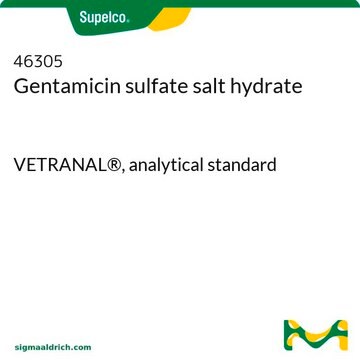G1272
Gentamicin
liquid, non-animal origin, suitable for cell culture, BioReagent
Synonym(s):
Garamycin, Gentiomycin C
About This Item
Recommended Products
product name
Gentamicin solution, 10 mg/mL in deionized water, liquid, 0.1 μm filtered, BioReagent, suitable for cell culture
biological source
microbial
Quality Level
sterility
0.1 μm filtered
product line
BioReagent
form
liquid
potency
10-12 mg per mL
concentration
10 mg/mL in deionized water
technique(s)
cell culture | mammalian: suitable
impurities
endotoxin, tested
color
colorless to light yellow
antibiotic activity spectrum
Gram-negative bacteria
Gram-positive bacteria
mycoplasma
Mode of action
protein synthesis | interferes
storage temp.
2-8°C
SMILES string
OS(O)(=O)=O.CN[C@@H]1[C@@H](O)[C@H](OC[C@]1(C)O)O[C@H]2[C@H](N)C[C@H](N)[C@@H](O[C@H]3O[C@H](CN)CC[C@H]3N)[C@@H]2O.CN[C@@H]4[C@@H](O)[C@H](OC[C@]4(C)O)O[C@H]5[C@H](N)C[C@H](N)[C@@H](O[C@H]6O[C@@H](CC[C@H]6N)[C@@H](C)N)[C@@H]5O.CN[C@H](C)[C@@H]7CC[C@@H](N)[C@H](O7)O[C@@H]8[C@@H](N)C[C@@H](N)[C@H](O[C@H]9OC[C@](C)(O)[C@H](NC)[C@H]9O)[C@H]8O
InChI
1S/C21H43N5O7.C20H41N5O7.C19H39N5O7.H2O4S/c1-9(25-3)13-6-5-10(22)19(31-13)32-16-11(23)7-12(24)17(14(16)27)33-20-15(28)18(26-4)21(2,29)8-30-20;1-8(21)12-5-4-9(22)18(30-12)31-15-10(23)6-11(24)16(13(15)26)32-19-14(27)17(25-3)20(2,28)7-29-19;1-19(27)7-28-18(13(26)16(19)24-2)31-15-11(23)5-10(22)14(12(15)25)30-17-9(21)4-3-8(6-20)29-17;1-5(2,3)4/h9-20,25-29H,5-8,22-24H2,1-4H3;8-19,25-28H,4-7,21-24H2,1-3H3;8-18,24-27H,3-7,20-23H2,1-2H3;(H2,1,2,3,4)/t9-,10-,11+,12-,13+,14+,15-,16-,17+,18-,19-,20-,21+;8-,9-,10+,11-,12+,13+,14-,15-,16+,17-,18-,19-,20+;8-,9+,10-,11+,12-,13+,14+,15-,16+,17+,18+,19-;/m110./s1
InChI key
RDEIXVOBVLKYNT-HDZPSJEVSA-N
Looking for similar products? Visit Product Comparison Guide
General description
Application
Biochem/physiol Actions
Antimicrobial spectrum: Includes Gram-negative and Gram-positive bacteria, including strains resistant to tetracycline, chloramphenicol, kanamycin and colistin, particularly strains of Pseudomonas, Proteus, Staphylococcus and Streptococcus.
Components
Caution
Signal Word
Danger
Hazard Statements
Precautionary Statements
Hazard Classifications
Resp. Sens. 1 - Skin Sens. 1
Storage Class Code
12 - Non Combustible Liquids
WGK
WGK 1
Flash Point(F)
Not applicable
Flash Point(C)
Not applicable
Certificates of Analysis (COA)
Search for Certificates of Analysis (COA) by entering the products Lot/Batch Number. Lot and Batch Numbers can be found on a product’s label following the words ‘Lot’ or ‘Batch’.
Already Own This Product?
Find documentation for the products that you have recently purchased in the Document Library.
Customers Also Viewed
Articles
Antibiotic kill curve is a dose response experiment in which mammalian cells are subjected to increasing amounts of selection antibiotic
Protocols
Discover our primary human hepatocytes and plating and maintenance media formulations. Explore our protocol for plateable primary hepatocyte cell culture.
Discover our protocol for thawing, plating, and forming hepatocyte spheroids from human spheroid-qualified plateable hepatocytes. Find the formulation for hepatocyte spheroid maintenance media.
Related Content
Explore our protocol for suspension primary hepatocyte cell culture. Discover our primary human hepatocytes and plating and maintenance media formulations.
Our team of scientists has experience in all areas of research including Life Science, Material Science, Chemical Synthesis, Chromatography, Analytical and many others.
Contact Technical Service






